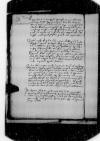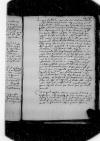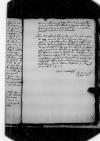Accepi hic paulo ante ⌊⌋ Dominationis Vestrae ⌊Barii⌋ 12 Martii datas, quibus animi sui erga me propensionem ubertim declaravit. Habeo illi, quas possum, gratias, me semper vicissim eum est habitura Dominatio Vestra, quem cupit, quod non verbis, ut in aulis usu receptum est, sed re ipsa modo quid possem pro Dominatione Vestra experietur.
Gratum mihi est, quod Dominatio Vestra ⌊⌋ meas ad magnificum dominum ⌊Ludovicum Aliphium⌋ aperuit et legit illique transmisit, ex his enim intellexit, quomodo res nostrae habeant. Ego adhuc in hoc clibano sudo et laboro. Misi praeterea grandem alium litterarum fasciculum ex Toleto ad Dominationem Vestram ⌊reginali maiestati⌋ inscriptum, qui si redditus est, nondum certo scio, rogo itaque Dominatio Vestra cum primis mihi significet, si illum accepit et reginali maiestati transmisit. Rem mihi impense gratam factura.
Quod Dominatio Vestra litteras meas cambii super 300 ducatos ad ⌊Welzeros⌋ suscepit, habeo gratias immensas. Accepit paulo post alias et ad praesens hinc iterum alias mitto. Multae hic expenduntur pecuniae pro statu et honore ⌊utriusque maiestatis⌋ servando. Ego hic revera ordinarie quolibet mense vix centum ducat(is) me sustinere possum, extraordinarie non parum etiam expenditur, de quibus omnibus bonam ⌊reginali maiestati⌋ rationem et fidei meae convenientem, Deo bene favente, aliquando coram sum redditurus.
Prudenter fecit Dominatio Vestra, quod de notis domino ⌊Ludovico⌋ missis copiam apud se conservavit, quibus confidentius inter nos scribere possumus, modo Dominatio Vestra saepius scribat, quo mihi nil gratius facere potest, ego non gravate semper respondebo.
 BCz, 242, p. 39
Ea, quae scribit Dominatio Vestra, quae acta sunt cum ⌊Antonello d(e) Monopoli encrypted ⌈MonopoliMonopoli encrypted ⌉⌋[1], nullam rebus nostris pariunt neque paritura sunt difficultatem. Observavi hic accurate omnia, quae per hostes nostros ea in re huc scriberentur locutusque sum aliquoties cum cancellario encrypted ⌈⌊cancellario⌋cancellario encrypted ⌉[2], qui de hoc facto se nihil scire dixit, addens insuper, si etiam quomodocumque hoc negotium fuisset transactum, nihil posse rebus nostris nocere convenique hac de re Loffredum encrypted ⌈⌊Loffredum⌋Loffredum encrypted ⌉[3], qui etiam ignorantiam istius rei praetendebat et consuluit mihi, quia ista omnia provenirent a Montealto encrypted ⌈⌊Montealto⌋Montealto encrypted ⌉[4], quod contra illum apud caesarem encrypted ⌈⌊caesarem⌋caesarem encrypted ⌉[5] exceptionem ut contra suspectum et adversarium nostrum facerem, dedi itaque ea in re ⌊⌋, quae fuit in rem nostram bene decretata, et cum litterae desuper fieri deberent, secretarius vel scribae, fortassis in favorem Montealto encrypted ⌈⌊Montealto⌋Montealto encrypted ⌉[6], se decretationem et minutam perdidisse asserebant, cum prius in integrum fere mensem me detinuissent promittentes iam iam litteras huiusmodi paratas fieri et hoc factum est quam primum huc vicerex encrypted ⌈⌊vicerex⌋vicerex encrypted ⌉[7] appulit, quod profecto tuli aegerrime, conquestus ⌊cancellario⌋, qui aliam decretationem in hoc casu se facere heri mihi est pollicitus. Sic hic tractatur et sic saepius hic deceptus sum. Nulla fides, etc. Hoc tamen negotium cum ⌊Antonello⌋ nihil nobis obesse potest, nullum aliud impedimentum, quam hanc depictam furcam hic sentio, quae etiam aliquando corruet.
BCz, 242, p. 39
Ea, quae scribit Dominatio Vestra, quae acta sunt cum ⌊Antonello d(e) Monopoli encrypted ⌈MonopoliMonopoli encrypted ⌉⌋[1], nullam rebus nostris pariunt neque paritura sunt difficultatem. Observavi hic accurate omnia, quae per hostes nostros ea in re huc scriberentur locutusque sum aliquoties cum cancellario encrypted ⌈⌊cancellario⌋cancellario encrypted ⌉[2], qui de hoc facto se nihil scire dixit, addens insuper, si etiam quomodocumque hoc negotium fuisset transactum, nihil posse rebus nostris nocere convenique hac de re Loffredum encrypted ⌈⌊Loffredum⌋Loffredum encrypted ⌉[3], qui etiam ignorantiam istius rei praetendebat et consuluit mihi, quia ista omnia provenirent a Montealto encrypted ⌈⌊Montealto⌋Montealto encrypted ⌉[4], quod contra illum apud caesarem encrypted ⌈⌊caesarem⌋caesarem encrypted ⌉[5] exceptionem ut contra suspectum et adversarium nostrum facerem, dedi itaque ea in re ⌊⌋, quae fuit in rem nostram bene decretata, et cum litterae desuper fieri deberent, secretarius vel scribae, fortassis in favorem Montealto encrypted ⌈⌊Montealto⌋Montealto encrypted ⌉[6], se decretationem et minutam perdidisse asserebant, cum prius in integrum fere mensem me detinuissent promittentes iam iam litteras huiusmodi paratas fieri et hoc factum est quam primum huc vicerex encrypted ⌈⌊vicerex⌋vicerex encrypted ⌉[7] appulit, quod profecto tuli aegerrime, conquestus ⌊cancellario⌋, qui aliam decretationem in hoc casu se facere heri mihi est pollicitus. Sic hic tractatur et sic saepius hic deceptus sum. Nulla fides, etc. Hoc tamen negotium cum ⌊Antonello⌋ nihil nobis obesse potest, nullum aliud impedimentum, quam hanc depictam furcam hic sentio, quae etiam aliquando corruet.
Cum castellano(?) encrypted ⌈castellano(?)castellano(?) encrypted ⌉[8] quid agatur, paucis accipiat. A ⌊Toleto⌋ in ⌊Hispalim⌋ <itum est>, inde ⌊hucus⌋que spe sum lactatus, quod absente vicerege encrypted ⌈⌊vicerege⌋vicerege encrypted ⌉[9] omnia ad votum nostrum conficerentur et nihil aliud, quam verba obtinui. Cancellarius encrypted ⌈⌊Cancellarius⌋Cancellarius encrypted ⌉[10] certe ex animo rebus nostris favet, nihil tamen adhuc potuit efficere.
 BCz, 242, p. 40
Ego caesarem encrypted ⌈⌊caesarem⌋caesarem encrypted ⌉[11] quotidie ferme infesto et molesto, sic enim cancellarius encrypted ⌈cancellariuscancellarius encrypted ⌉[12] mihi consuluit, sed nihil ex eo aliud extorquere possum, quam quod promittit se finem facturum quamprimum est possibile et pridie mihi pollicitus est, cum acerrime a me admoneretur, quod de castellano(?) encrypted ⌈castellano(?)castellano(?) encrypted ⌉[13], antequam hinc exeat, me omnimode vult absolvere. Quicquid erit, Dominatio Vestra cum primis sciet. Loffredus encrypted ⌈LoffredusLoffredus encrypted ⌉[14] libenter aliquem de suis in castellanum(?) encrypted ⌈castellanum(?)castellanum(?) encrypted ⌉[15] intruderet, utcumque modo illud recuperare possimus, in quo nulla vigilantia, cura et opera a me omittetur, quam primum istius rei re superinscribed in place of crossed-out ab⌈abrere superinscribed in place of crossed-out ab⌉solutionem habuero, mittam hinc ad ⌊regiam⌋ et ⌊reginalem maiestatem⌋ proprium meum nuntium, ut me tandem semel ex hoc labyrintho explicare possim. Timeo tamen, quod res in moram ducetur de industria, neque prius finem habebimus, donec cum V encrypted ⌈VV encrypted ⌉ et de E encrypted ⌈EE encrypted ⌉ et 7 encrypted ⌈77 encrypted ⌉ omnimode conclusum fuerit, quemadmodum ad N encrypted ⌈NN encrypted ⌉ id aliquoties perscripsi. Quam libens ⌊hic⌋ in his flammis et ardoribus maneo, Deo cognitum est, nihilominus nihil durum aut grave mihi videretur, modo bene rebus mihi commissis inservire possem. Parum deest de tribus annis, quo ⌊Cracoviam⌋ exivi et res meas omnes amisi ms. omisi(!)
⌈amisiamisi ms. omisi(!)
⌉ mihique nullum profectum feci, et hoc ferendum est, modo res ⌊principum nostrorum⌋ bene succederent, ne viderer
cf. Adagia No. 362 oleum et operam perdidi ⌊et operam et oleum perdidissecf. Adagia No. 362 oleum et operam perdidi ⌋.
BCz, 242, p. 40
Ego caesarem encrypted ⌈⌊caesarem⌋caesarem encrypted ⌉[11] quotidie ferme infesto et molesto, sic enim cancellarius encrypted ⌈cancellariuscancellarius encrypted ⌉[12] mihi consuluit, sed nihil ex eo aliud extorquere possum, quam quod promittit se finem facturum quamprimum est possibile et pridie mihi pollicitus est, cum acerrime a me admoneretur, quod de castellano(?) encrypted ⌈castellano(?)castellano(?) encrypted ⌉[13], antequam hinc exeat, me omnimode vult absolvere. Quicquid erit, Dominatio Vestra cum primis sciet. Loffredus encrypted ⌈LoffredusLoffredus encrypted ⌉[14] libenter aliquem de suis in castellanum(?) encrypted ⌈castellanum(?)castellanum(?) encrypted ⌉[15] intruderet, utcumque modo illud recuperare possimus, in quo nulla vigilantia, cura et opera a me omittetur, quam primum istius rei re superinscribed in place of crossed-out ab⌈abrere superinscribed in place of crossed-out ab⌉solutionem habuero, mittam hinc ad ⌊regiam⌋ et ⌊reginalem maiestatem⌋ proprium meum nuntium, ut me tandem semel ex hoc labyrintho explicare possim. Timeo tamen, quod res in moram ducetur de industria, neque prius finem habebimus, donec cum V encrypted ⌈VV encrypted ⌉ et de E encrypted ⌈EE encrypted ⌉ et 7 encrypted ⌈77 encrypted ⌉ omnimode conclusum fuerit, quemadmodum ad N encrypted ⌈NN encrypted ⌉ id aliquoties perscripsi. Quam libens ⌊hic⌋ in his flammis et ardoribus maneo, Deo cognitum est, nihilominus nihil durum aut grave mihi videretur, modo bene rebus mihi commissis inservire possem. Parum deest de tribus annis, quo ⌊Cracoviam⌋ exivi et res meas omnes amisi ms. omisi(!)
⌈amisiamisi ms. omisi(!)
⌉ mihique nullum profectum feci, et hoc ferendum est, modo res ⌊principum nostrorum⌋ bene succederent, ne viderer
cf. Adagia No. 362 oleum et operam perdidi ⌊et operam et oleum perdidissecf. Adagia No. 362 oleum et operam perdidi ⌋.
Nova hic alia non habemus, quam quae ex ⌊Italia⌋ huc afferuntur. Illa Dominatio Vestra, quae propinquior est, melius novit. Hic omnia plena sunt turbinibus. Erat paulo ante multorum opinio ⌊caesarem⌋ hoc anno in ⌊Italiam⌋ concessurum, quae penitus evanuit. Quid ex his tumultibus futurum, exitus docebit.
 BCz, 242, p. 41
BCz, 242, p. 41
Nemini felicius quam ⌊regi Franciae⌋ successit, qui sine suo detrimento liberatus regnat, relictis hic ⌊duobus pueris⌋, quos etiam propediem mitioribus fortassis conditionibus liberabit.
Alia non restant. Commendo me Dominationi Vestrae summopere et rogo amore et benevolentia sua, qua cepit, me prosequatur. Negotia ⌊capituli sancti Nicolai⌋ et ⌊universitatis Barensis⌋ quantum potui et apud ⌊caesarem⌋ atque apud omnes, ubi prodesse potui, promovi et adiuvi, quemadmodum hoc frater ⌊Marcus⌋ uberius testabitur. Desiderium etiam domini doctoris ⌊Sigismundi de Russis⌋, cum oportunitas dabitur, quantum eniti possum, non frustrabor. Rescripsissem illi, si postae celeritas permisisset.
 BCz, 242, p. 39
Ea, quae scribit Dominatio Vestra, quae acta sunt cum
BCz, 242, p. 39
Ea, quae scribit Dominatio Vestra, quae acta sunt cum  BCz, 242, p. 40
Ego caesarem encrypted ⌈
BCz, 242, p. 40
Ego caesarem encrypted ⌈


